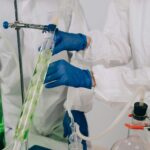Introduction:
Pursuing a Ph.D. in chemical engineering is an exciting and intellectually rewarding endeavor. It requires careful preparation, a solid academic foundation, and a deep commitment to research and academic excellence. By following a systematic approach and embracing opportunities for growth, aspiring Ph.D. candidates can pave the way for a successful journey in chemical engineering.
- Exploring Your Interests:
Embark on your Ph.D. preparation by exploring your specific interests within the vast field of chemical engineering. Delve into research papers, attend conferences, and engage with experts to understand the current trends and challenges in the discipline. Identifying your passions and aligning them with your career goals will set the stage for a fulfilling Ph.D. experience.
- Identifying Potential Advisors and Programs:
Conduct thorough research to identify renowned researchers and professors whose work aligns with your research aspirations. Look for universities and institutions that offer Ph.D. programs in chemical engineering and have a strong emphasis on your chosen area of interest. Building a connection with potential advisors who share your research vision is crucial for a successful Ph.D. journey.
- Strengthening Your Academic Foundation:
A strong academic foundation is essential for excelling in a Ph.D. program. Review the undergraduate and master’s level courses in chemical engineering to ensure you have a solid understanding of core concepts. Identify any knowledge gaps and consider taking additional courses or engaging in self-study to strengthen your expertise in those areas.
- Building Research Experience:
Gaining research experience is a significant aspect of a Ph.D. program. Seek out research opportunities through internships, undergraduate research programs, or collaborations with professors. Actively contribute to research projects, learn experimental techniques, and develop critical thinking and problem-solving skills. Engaging in research early on will enhance your candidacy and lay a strong foundation for your Ph.D. journey.
- Developing Strong References:
Cultivate relationships with professors, mentors, and professionals who can provide strong recommendation letters for your Ph.D. application. Engage in meaningful discussions with them, seek guidance, and demonstrate your dedication to research and academia. Strong references can significantly bolster your application and increase your chances of securing admission to a reputable Ph.D. program.
- Crafting a Compelling Statement of Purpose:
Craft a well-written and thoughtful statement of purpose that conveys your research interests, career goals, and motivation to pursue a Ph.D. in chemical engineering. Highlight your relevant research experience, academic achievements, and articulate how your goals align with the prospective program and advisor. A compelling statement of purpose can make a positive impression on admissions committees.
- Preparing for Standardized Tests:
Many Ph.D. programs require standardized test scores, such as the GRE (Graduate Record Examination) or language proficiency tests like the TOEFL or IELTS for international students. Familiarize yourself with the test format, practice sample questions, and allocate dedicated time for focused test preparation. Preparing well for standardized tests will strengthen your application and demonstrate your readiness for rigorous academic work.
- Securing Funding Opportunities:
Investigate potential funding opportunities, such as research assistantships, teaching assistantships, fellowships, or scholarships. Research the funding options offered by universities and programs of interest and understand the application process and deadlines. Securing funding will not only provide financial support but also enhance your research experience and networking opportunities.
- Enhancing Writing and Communication Skills:
Effective communication skills are vital for success in a Ph.D. program. Sharpen your writing skills by practicing scientific writing, attending workshops, and seeking feedback on your written work. Develop your presentation and public speaking skills as you will be required to present your research findings during seminars, conferences, and thesis defenses. Cultivating strong communication skills will enable you to effectively convey your research and collaborate with peers and professionals.
- Staying Engaged and Current:
Stay informed about the latest advancements and research in chemical engineering by regularly reading scientific journals, attending conferences, and engaging with professional societies. Participate in conferences, workshops, and networking events to build connections and stay up to date with ongoing research in your field. Actively engaging with the scientific community will broaden your knowledge and foster collaborative opportunities.
Conclusion:
Preparing for a Ph.D. in chemical engineering is an exhilarating process that requires dedication, intellectual curiosity, and a genuine passion for research. By exploring your interests, building a strong academic foundation, gaining research experience, and developing essential skills, you can position yourself for success in your Ph.D. journey. Remember to leverage the guidance and support of mentors, seek research opportunities, and stay engaged with the latest developments in the field. Embrace the challenges and opportunities that lie ahead, and embark on a transformative academic journey in pursuit of excellence in chemical engineering.















